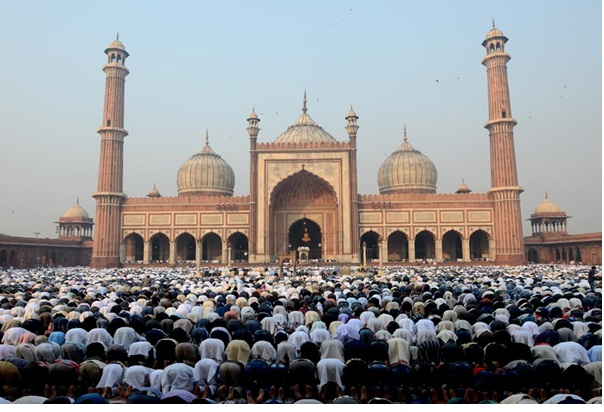By Ahmed Ali
What is Eid -Ul -Fitr?
The word Eid, literally means the recurring happiness.Eid-ul- fitr also called as lesser Eid, is an important religious holiday celebrated by Muslims worldwide that marks the end of Ramadaan,the Islamic of fasting (sawm), from sunrise to sunset, have restrained themselves from material and spiritual vices .The Eid is a single day during which Muslims are not permitted to fast.
When is Eid-Ul-Fitr?
The Eid-ul-Fitr celebrates the conclusion of dawn to sunset fasting during the entire month of Ramadan, the most venerated month of Hijri calendar. The Eid, therefore, fall on first day of Shawwal, and the tenth month in the Islamic lunar calendar. This is the day Muslims around the world show a common goal of unity. The date for the start of any lunar hijri month varies based on the observation of new moon by local religious authorities, such as Ruiyat e Hilal, in India, so the exact day of celebration varies by locality. However in most countries, it is generally on the same day as Saudi Arabia. Traditionally it is the day of the first sighting of the crescent moon shortly after sunset. If the moon is not observed, immediately after 29 day of the previous lunar month, then it is the following day.
How Eid is celebrated:
Eid ul fitr has a particular salaah consisting of two rakaah and generally offered in Idgah, open field or, mosque. It may perform only in congregation and has an extra additional takbeers, three of them in beginning of the first rakaah and three of them just before ruku in the second rakaah. Common greeting during this holiday is EID MUBARAK. There is no obligation for woman to pray salatul Eid, however, they are encouraged to, and so, women may join the congregation in masjids that facilitates for women. No call to prayer is given for this prayer, The Eid prayer is followed by a sermon and then a supplication asking for God’s forgiveness, mercy peace, blessing for all the living beings across the world. After the salaah Muslims embrace each other saying “Takabbal Allahu Minna wa Minkum” (May Allah accepts this worship from us and you).Muslims visit their relatives, friends and acquaintances or hold large communal celebrations. In addition, Muslims visit graveyard, and pray for their soul.
Eid gift known as eidi are frequently given to children and relatives.
Interesting facts:
Muslims are encouraged on this day to forgive and forget any differences with others or animosities that may have occurred during the year.
Muslims believed that they are commanded by Allah, as mentioned in the Quran, to continue the fast until the last day of Ramadaaan and pay
- Zakat, One of the five pillars of Islam. An obligatory charity given to the poor, It is considered to be a
responsibility to ease the economic hardship for other Muslims and eliminate the inequality. It is vital to remember Muslims around the worlds who are less fortunate.
- Fitra (obligatory form of charity given to the poor).In order to, poor too, can celebrate and enjoy the Eid.Usually the head of the household pays on behalf of every one in his/her family.
Some important points to remember before Eid salaah:
- Take shower
- Put on new clothes (or best available) and apply perfumes.
- Pay Fitra (as an obligatory act of charity, money is paid to the poor and needy.
- Eat some sweets preferably a date.
- Recommended to use separate route to and from the Masjid/Idgah.
- Recite in a low voice while going and returning from mosque “ALLAHU AKBAR, ALLAHU AKBAR, ALLAHU AKBAR, LA ILAHA IALLA-LAH WAL LAHU AKBAR, ALAAHU AKBAR WALIL-LAHI L HAMD”.
Typically, practicing Muslims wake up early (always before sun rise) offer salatul Fajr keeping with traditions of prophet .It is forbidden to fast on the Day of Eid (Sahih Muslim Vol.No.2 Book of Fasting, Hadith 2534)
For Muslims Eid-ul-fitr is occasion for showing gratitude to God and remembering Him and is an occasion of entertainment.
We must all remember after we have left Ramadaan and Eid behind that our purpose remains to always seek the pleasure of Allah by glorifying Him and rendering thanks to Him for having bestowed such blessings upon s and enabling us tom perform our daily duties.
[ The writer currently lives in Manchester, UK and is working in Central Manchester University Hospitals, NHS Foundation Trust. He can be contacted at: ahmed-ali(at)doctor(dot)com ]


Please Fitra as wajib not obligatory.It is a mistake.